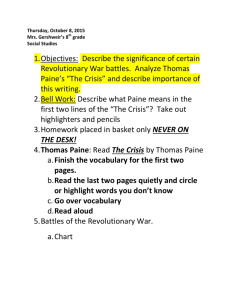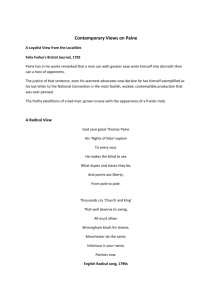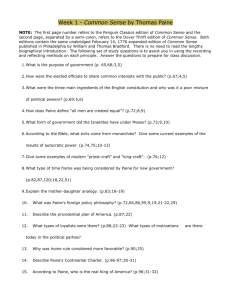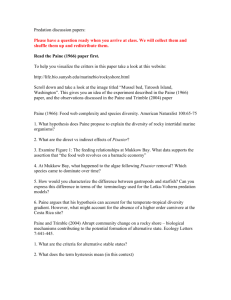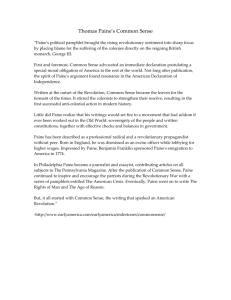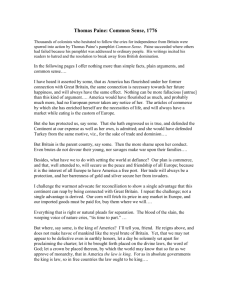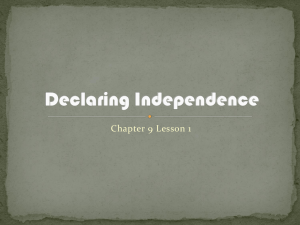Ismail Desouki Professor Stockwell Poli 5 2 February, 2011 Thomas
advertisement
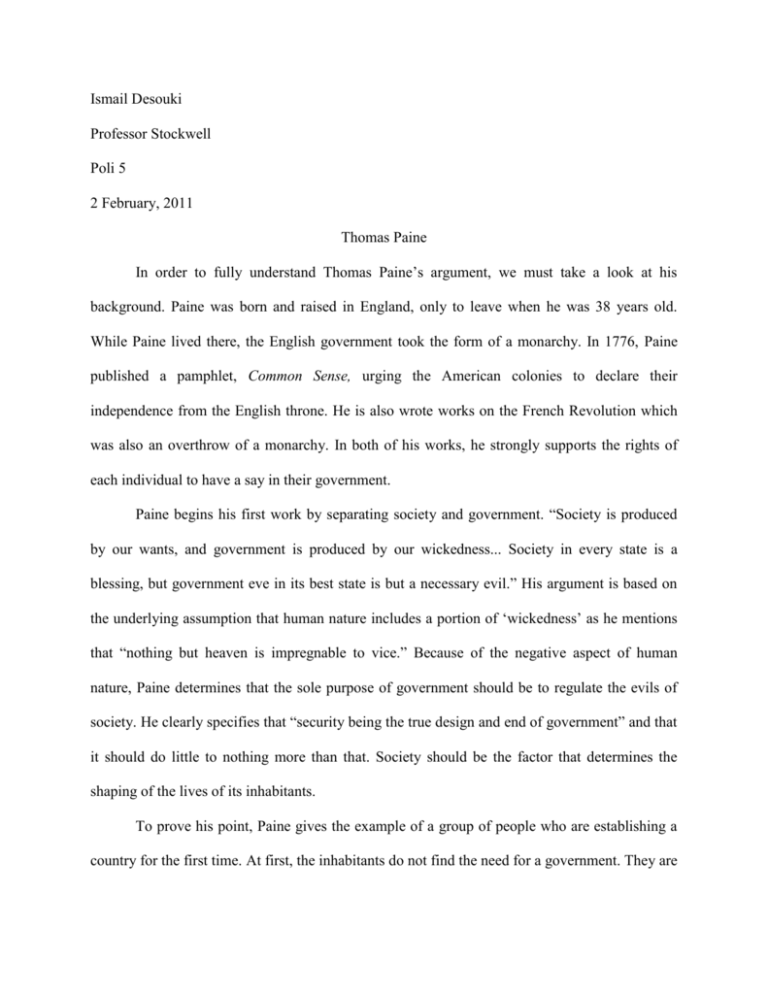
Ismail Desouki Professor Stockwell Poli 5 2 February, 2011 Thomas Paine In order to fully understand Thomas Paine’s argument, we must take a look at his background. Paine was born and raised in England, only to leave when he was 38 years old. While Paine lived there, the English government took the form of a monarchy. In 1776, Paine published a pamphlet, Common Sense, urging the American colonies to declare their independence from the English throne. He is also wrote works on the French Revolution which was also an overthrow of a monarchy. In both of his works, he strongly supports the rights of each individual to have a say in their government. Paine begins his first work by separating society and government. “Society is produced by our wants, and government is produced by our wickedness... Society in every state is a blessing, but government eve in its best state is but a necessary evil.” His argument is based on the underlying assumption that human nature includes a portion of ‘wickedness’ as he mentions that “nothing but heaven is impregnable to vice.” Because of the negative aspect of human nature, Paine determines that the sole purpose of government should be to regulate the evils of society. He clearly specifies that “security being the true design and end of government” and that it should do little to nothing more than that. Society should be the factor that determines the shaping of the lives of its inhabitants. To prove his point, Paine gives the example of a group of people who are establishing a country for the first time. At first, the inhabitants do not find the need for a government. They are able to help each other when needed, and overall live happily together; however, slowly, they “begin to relax in their duty and attachment to each other.” This slowly starts to create problems between the citizens, and they finally “point out the necessity, of establishing some form of government to supply the defect of moral virtue.” They would then establish a government in which “every man, by natural right will have a seat” and their first order of business would be to only pass laws that regulate the evils of society. As the colony increases, the number of representatives would like-wise increase and it would eventually become a democracy based directly on population. In this form of government, the elected would always represent the interests of the electors; the will “mutually and naturally support each other.” After outlining the purpose of the government and giving an example of an ideal government, Paine criticizes the corrupt monarchies of Europe. He argues that England’s constitution was “noble for the dark and slavish times in which it was erected” however it has now become “incapable of producing what it seems to promises.” In The Rights of Man Paine continues to criticize the European governments as he attacks the tradition of inheriting power. He believes that “every age and generation must be as free to act for itself, in all cases, as the ages and generations which preceded it.” Although Paine makes a convincing argument, I only agree with the second half of it. Monarchies in Europe may have brought about great change and progress from the governments that preceded them, however, they were obviously inefficient and not effective. Democracies are a much better system than the traditional rule of the elites. I also agree that a democracy based solely on population is the ideal system of government to rule a people. There is one point I disagree with his opinion on the function of the government and society. I believe the government has much more responsibility that just providing physical security. I believe that it is the responsibility of the government to heavily regulate the markets and provide social welfare programs for the common people to be able to have a safety net. It must be the job of the government to provide equal opportunities for all of its citizens. When governments play to small of a role in society, class structures become rigid and individuals find it hard to advance in society. Regulating the market would decrease this problem; however, it may have some problems. Any government intervention in economics causes inefficiency, therefore restricting economic growth, however, I believe regulation is necessary because although growth is restricted, so are the failures of the economy. Paine made valid arguments that addressed issues that arose during his time period and was able to support this with evidence; however, I don’t believe he was able to foresee the effects of too little government intervention. I believe that there should be a balance where the government can provide basic services to all of those in need, but capitalism and basic freedoms are still essential components of that system.
